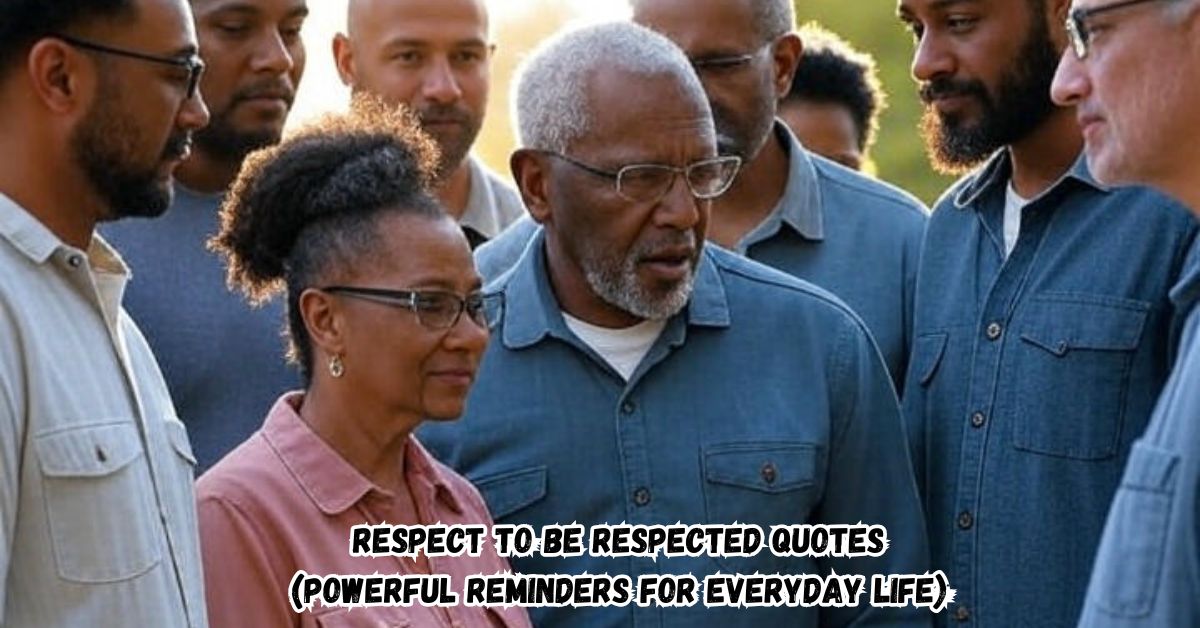Respect is the invisible thread that weaves through every meaningful relationship in our lives. It shapes how we connect with family, friends, colleagues, and strangers alike. These powerful quotes serve as daily reminders that respect isn’t just about good manners or social etiquette.
The concept of mutual respect forms the foundation of healthy interactions. When we show respect to others, we create an environment where trust and understanding can flourish. These timeless sayings capture the essence of what it means to treat people with dignity and kindness.
Self-respect begins the journey toward earning the respect of others. When we honor our own values and maintain our boundaries, we teach others how to treat us. This awareness of our own worth naturally extends to how we perceive and interact with those around us.
Respect to Be Respected Quotes
Respect to Be Respected Quotes offer timeless wisdom that guides our daily interactions with others. These powerful sayings remind us that respect is a two-way street built on trust, understanding, and genuine care for one another.
1. “Respect is earned, not given.”
This fundamental truth reminds us that genuine respect cannot be demanded or forced upon others. It must be cultivated through consistent actions that demonstrate our character and integrity. When we approach others with authenticity, they naturally respond with the same level of regard.
Earning respect takes time and requires patience. It means showing up consistently, keeping our word, and treating others with kindness even when it’s difficult. This process creates lasting connections that enrich our lives and strengthen our communities.
The beauty of earned respect lies in its durability. Unlike superficial admiration based on position or power, true respect withstands challenges and grows stronger over time. It becomes the bedrock upon which meaningful relationships are built.
2. “Treat people how you want to be treated.”
The golden rule of human interaction emphasizes the importance of empathy and understanding. This simple yet profound principle guides our manners and shapes how we interact with others in every situation. When we practice this consideration, we create positive cycles of respectful behavior.
This universal wisdom transcends religious and cultural boundaries. It speaks to our innate understanding that we all share similar needs for dignity, acceptance, and kindness. By applying this principle consistently, we contribute to a more harmonious world.
The challenge lies in maintaining this standard even when others don’t reciprocate. True respect means treating others well because of who we are, not because of who they are. This integrity becomes a reflection of our character and values.
3. “To gain respect, you must first give it.”
Deep respect flows naturally when we approach others with courtesy and consideration. This quote highlights the reciprocal nature of respectful relationships and the importance of taking the first step. By initiating respectful interactions, we set the tone for mutual understanding.
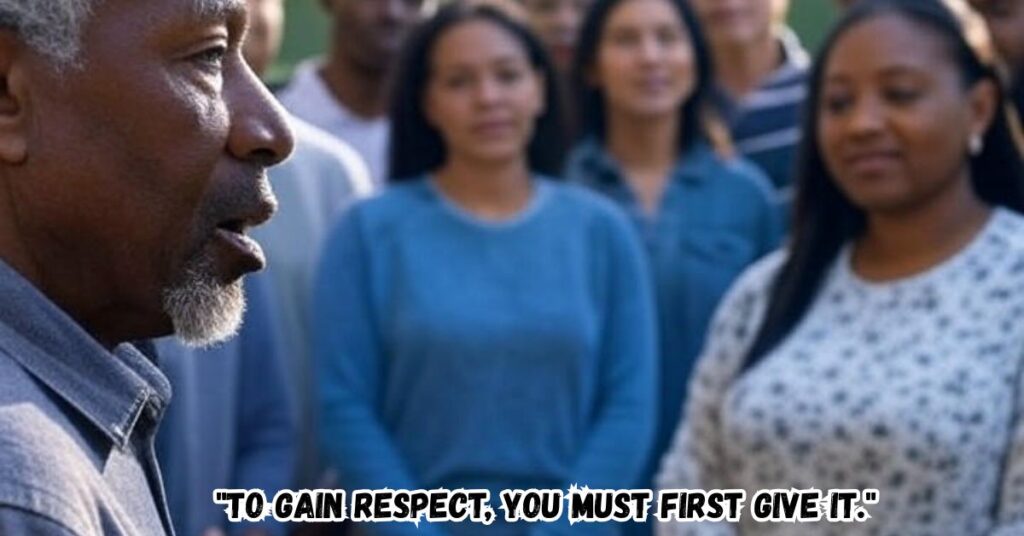
Taking the initiative to give respect demonstrates emotional maturity and wisdom. It shows that we understand the connection between our actions and the responses we receive from others. This proactive approach often creates positive momentum in relationships.
The act of giving respect freely, without expecting immediate returns, demonstrates authentic character. It shows that we value others for their inherent worth as human beings, not for what they can do for us.
4. “Respect yourself, and others will respect you.”
Self-respect forms the foundation of all other respectful relationships. When we value our own dignity and maintain our boundaries, we teach others how to treat us. This awareness of our own worth creates a standard that others naturally follow.
People who respect themselves carry themselves differently. They speak with confidence, make decisions based on their values, and don’t compromise their integrity for short-term gains. This authenticity attracts genuine respect from others.
READ MORE BLOG : Good Night Messages For Her: Romantic, Sweet, Flirty & More
Respecting yourself also means taking care of your physical and emotional well-being. It involves setting healthy boundaries, pursuing personal growth, and surrounding yourself with people who support your journey toward becoming your best self.
5. “Respect is one of the greatest expressions of love.”
In both personal and professional relationships, showing respect demonstrates care and appreciation. This connection between respect and love creates stronger, more meaningful bonds with those we encounter daily. True love cannot exist without mutual respect as its foundation.
When we respect someone, we acknowledge their inherent worth and dignity. We listen to their perspectives, honor their feelings, and treat them with kindness even during disagreements. This level of care deepens our connections and creates lasting relationships.
The absence of respect in relationships often leads to their deterioration. Without this foundation, even the strongest bonds can crumble under the weight of misunderstanding and conflict. Respect serves as the protective barrier that keeps love alive.
6. “Respect is not something that comes easily. It’s something you earn by staying true to who you are.”
Authentic behavior and consistency in our actions help us cultivate the respect we seek from others. Being genuine in all our interactions builds trust and credibility. This integrity becomes the bedrock upon which lasting relationships are built.
Staying true to ourselves requires courage, especially when facing pressure to conform or compromise our values. It means making difficult choices that align with our principles, even when easier options are available. This commitment to authenticity earns genuine respect.
The process of earning respect through authenticity is ongoing. It requires constant self-reflection and the willingness to grow while maintaining our core values. This balance between growth and consistency creates trustworthy character.
7. “The way you treat others shows the type of person you are.”
Our character is reflected in how we treat people, regardless of their circumstances or status. This quote reminds us that respecting others is a direct reflection of our own moral compass and values. Every interaction becomes an opportunity to demonstrate who we truly are.
How we treat the server at a restaurant, the janitor at work, or the person asking for directions reveals our true character. These seemingly small interactions often matter more than how we behave around people who can benefit our careers or social standing.
True character is revealed when no one is watching or when there’s no personal benefit involved. The person who consistently treats others with respect and kindness, regardless of the circumstances, demonstrates authentic character and integrity.
8. “When you show deep respect for others, you elevate yourself.”
Personal growth occurs when we consistently practice respectful behavior. This elevation of our own character happens naturally when we focus on understanding and accepting others. The act of respecting others transforms us into better versions of ourselves.
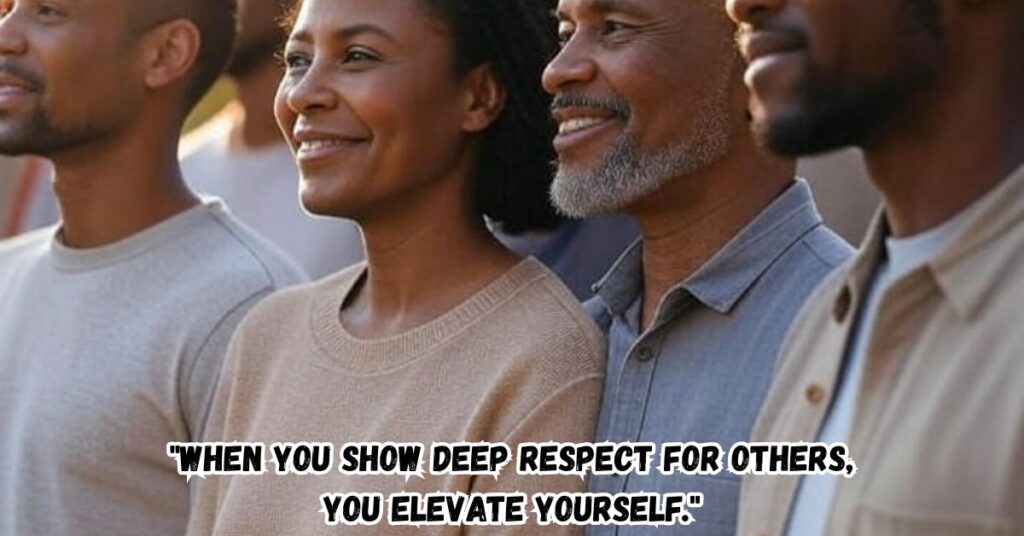
Showing respect requires us to look beyond our own immediate needs and consider the feelings and perspectives of others. This shift from self-centered thinking to other-centered consideration develops our empathy and emotional intelligence.
The elevation that comes from respecting others is both internal and external. Internally, we develop greater compassion and understanding. Externally, others recognize and respond to our respectful nature, creating opportunities for deeper connections and mutual growth.
9. “Give respect, and you will get it back in return.”
The law of reciprocity applies strongly to respectful relationships. When we consistently show respect, we create an environment where others feel comfortable doing the same. This positive cycle strengthens our connections and builds trust over time.
Giving respect first requires us to take the initiative in creating positive interactions. It means choosing to see the best in others and treating them accordingly, even when we’re unsure of their intentions or character.
The return on respectful behavior often exceeds our initial investment. When we treat others with dignity and kindness, we often receive not just respect in return, but also trust, cooperation, and genuine friendship.
10. “Respect begins with listening.”
Active listening demonstrates genuine interest and care for others’ perspectives. This fundamental skill forms the basis of effective communication and mutual understanding. When we truly listen, we honor the person speaking and create space for meaningful dialogue.
Listening with respect means giving our full attention to the speaker. It involves putting aside our own agenda, avoiding interruptions, and trying to understand their point of view. This level of consideration shows that we value their thoughts and feelings.
The art of respectful listening goes beyond hearing words. It involves observing body language, acknowledging emotions, and asking clarifying questions when appropriate. This deep listening creates connections that transcend superficial interactions.
11. “Respect is how to treat everyone, not just those you want to impress.”
True respect doesn’t discriminate based on power, position, or personal benefit. Treating all people with dignity regardless of their circumstances shows authentic character. This universal approach to respect creates equality in our interactions.
The test of our character often comes in how we treat those who cannot benefit us professionally or socially. The person who shows respect to everyone, from the CEO to the parking attendant, demonstrates genuine integrity and humility.
READ MORE BLOG : Happy Together Quotes for Couples
Universal respect recognizes the inherent worth and dignity of every human being. It acknowledges that everyone has a story, struggles, and dreams that deserve consideration and kindness, regardless of their current circumstances or social standing.
12. “When we treat people with respect, we build trust.”
Trust and respect are inseparable elements of healthy relationships. This foundation supports both personal and professional interactions, creating harmony and cooperation. Without respect, trust cannot flourish, and relationships remain superficial.
Trust develops gradually through consistent respectful behavior. When people know they can count on us to treat them with dignity and kindness, they become more willing to be vulnerable and authentic in their interactions with us.
The trust built through respectful treatment creates a positive feedback loop. As trust grows, people become more open and honest, which deepens the relationship and creates even stronger bonds of mutual respect and understanding.
13. “Respect for ourselves guides our morals, respect for others guides our manners.”
This quote beautifully illustrates how self-respect influences our internal values while respecting others shapes our external behavior and social interactions. Both aspects work together to create a complete approach to respectful living.
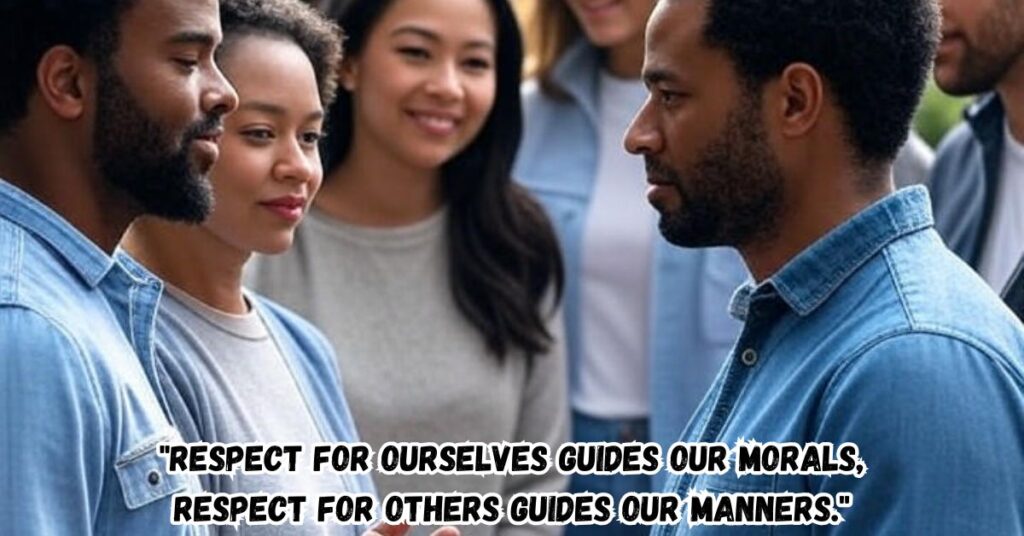
Our morals stem from respecting ourselves enough to live according to our values and principles. This internal compass guides our decisions and helps us maintain integrity even when faced with difficult choices or temptations.
Our manners reflect how we respect others in our daily interactions. They demonstrate our consideration for others’ feelings, comfort, and dignity. Good manners are external expressions of internal respect and kindness.
14. “The respect you give is the respect you’ll get.”
This simple truth emphasizes the mirror-like nature of respectful relationships. Our actions and attitudes toward others often reflect back to us in similar measures. This universal principle encourages us to be mindful of how we treat those around us.
The mirroring effect of respect isn’t always immediate, but it’s remarkably consistent over time. People remember how we make them feel, and they tend to respond to us based on those memories and experiences.
Understanding this principle empowers us to take control of the quality of our relationships. By choosing to give respect consistently, we increase the likelihood of receiving respectful treatment in return, creating more positive and fulfilling interactions.
15. “Respect isn’t something you can demand. It’s something you earn.”
Demanding respect rarely produces genuine results and often creates resentment. Instead, earning respect through consistent positive actions and integrity creates lasting connections. This process requires humility and patience but yields more meaningful relationships.
The attempt to demand respect often backfires because it violates the very principle of respect itself. True respect is freely given, not coerced or manipulated. It comes from genuine appreciation for someone’s character and actions.
Earning respect is an ongoing process that requires consistency and authenticity. It means doing the right thing even when no one is watching, keeping our commitments, and treating others with kindness and consideration in all circumstances.
16. “To have respect for others, we must first have respect for ourselves.”
Self-awareness and personal growth enable us to extend genuine respect to others. Without this foundation, our efforts may lack authenticity and depth. Respecting yourself becomes the starting point for all other respectful interactions.
People who lack self-respect often struggle to respect others genuinely. They may act respectfully out of fear or obligation, but their interactions lack the authenticity that comes from true respect. Self-respect provides the emotional and mental foundation for genuine interactions.
Developing self-respect involves accepting ourselves while striving for growth. It means acknowledging our strengths and weaknesses, setting healthy boundaries, and treating ourselves with the same kindness we would show a good friend.
17. “Respect comes in many forms, but it always starts with kindness.”
Kindness serves as the gateway to deeper respect and understanding. Small acts of consideration often lead to more significant respectful relationships. This simple approach makes respect accessible to everyone in their daily interactions.
Kindness is the most basic form of respect because it acknowledges humanity in others. It doesn’t require special skills or training, just the willingness to treat others with care and consideration. This accessibility makes kindness a powerful tool for building respect.
The kindness that leads to respect is genuine and unconditional. It’s not performed for personal gain but flows from a sincere desire to make others feel valued and appreciated. This authentic kindness creates lasting impressions and builds strong foundations for relationships.
18. “True respect is being able to disagree without being disrespectful.”
Healthy disagreement can coexist with mutual respect when we focus on understanding different perspectives rather than attacking the person behind them. This maturity allows for growth and learning while maintaining dignity for all parties involved.
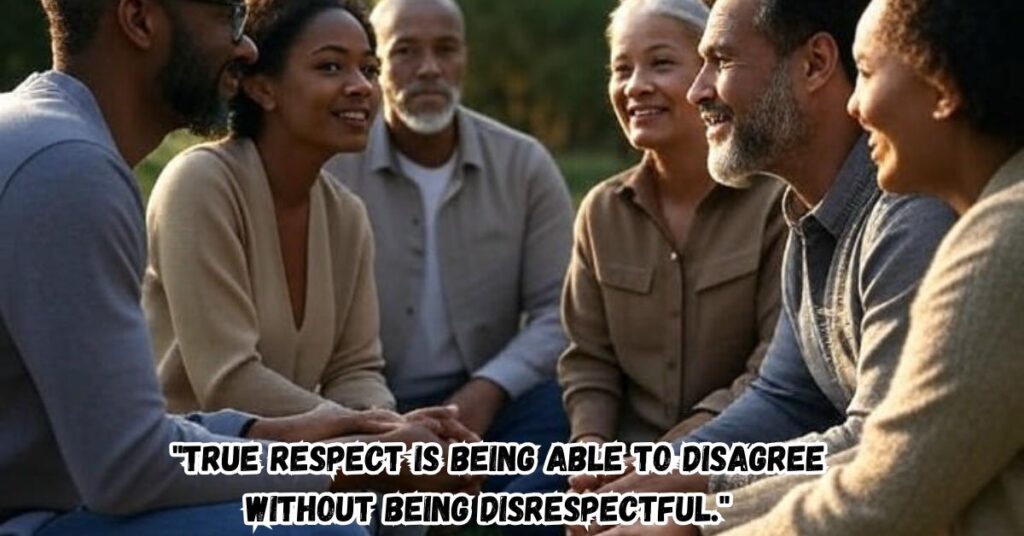
Respectful disagreement requires emotional intelligence and self-control. It means separating ideas from individuals and addressing concepts rather than attacking character. This approach allows for productive discussions and mutual learning.
The ability to disagree respectfully demonstrates emotional maturity and wisdom. It shows that we can hold our convictions while still valuing others as human beings. This skill is essential for maintaining relationships through inevitable differences of opinion.
19. “A lack of boundaries invites a lack of respect.”
Clear boundaries protect both ourselves and others while maintaining respectful interactions. When we respect ourselves enough to set limits, others learn to do the same. These boundaries create safe spaces where respect can flourish.
Boundaries are not walls designed to keep people out, but guidelines that help maintain healthy relationships. They communicate our values and expectations while showing respect for both our own and others’ well-being.
People who consistently violate boundaries often lack respect for themselves and others. By maintaining clear, consistent boundaries, we teach others how to treat us and create environments where mutual respect can develop and thrive.
20. “Respect means accepting people for who they are, even when they’re different from you.”
Diversity and acceptance go hand in hand with true respect. Embracing differences while maintaining dignity for all creates richer, more inclusive relationships. This understanding celebrates the universal human experience while honoring individual uniqueness.
Accepting others doesn’t mean agreeing with everything they do or believe. It means recognizing their right to be different and treating them with dignity regardless of those differences. This level of respect requires empathy and open-mindedness.
The respect that comes from accepting differences enriches our own lives. It exposes us to new perspectives, challenges our assumptions, and helps us grow as individuals. This diversity of relationships creates a more fulfilling and meaningful life experience.
Frequently Asked Questions
How can I earn respect from difficult people?
Focus on consistent respectful behavior regardless of their attitude, maintain your boundaries, and demonstrate integrity through your actions over time.
What should I do when someone shows me a lack of respect?
Address the behavior calmly and directly, maintain your own respectful standards, and consider whether the relationship serves your well-being and growth.
How can I teach my children about respect?
Model respectful behavior in your daily interactions, explain the importance of treating others with kindness, and praise them when they show consideration for others.
Is it possible to respect someone I strongly disagree with?
Yes, true respect means valuing someone’s dignity as a person while disagreeing with their ideas or actions in a courteous and thoughtful manner.
How do I balance self-respect with being kind to others?
Self-respect and kindness work together by setting healthy boundaries while treating others with dignity, showing that you value both yourself and others appropriately.
Conclusion
These powerful quotes about respect serve as daily reminders that respectful relationships require ongoing effort, authenticity, and commitment. Mutual respect creates the foundation for trust, understanding, and meaningful connections in all areas of life.
Respect is not a destination but a journey of continuous growth and awareness. It begins with respecting yourself and naturally extends to how you treat others. By applying these principles consistently, you create positive ripple effects that improve not only your own relationships but also contribute to a more respectful and harmonious society.

Bolt is a seasoned SEO expert with a passion for content writing, keyword research, and web development. He combines technical expertise with creative strategies to deliver exceptional digital solutions.
